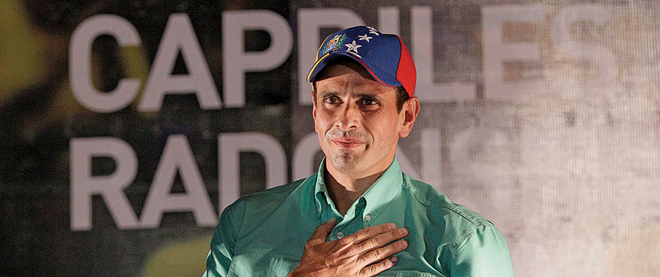A man to unseat Chávez?
Henrique Capriles represents an alliance of 20 opposition political parties and movements
Ariana Cubillos/AP
Share

Henrique Capriles, governor of Venezuela’s Miranda state, has won an opposition primary with 62 per cent of the vote and will face incumbent Hugo Chávez in October’s presidential ballot. Capriles, 39, will represent the Coalition for Democratic Unity (MUD), an alliance of 20 opposition political parties and movements. Almost three million Venezuelans—about 16 per cent of the electorate—participated in the national primary last Feb. 12; opposition candidates for regional mayoral and gubernatorial elections were also elected.
This is the first time opposition parties have organized under an umbrella and held a ballot to select unified candidates since Chávez was elected in 1999. MUD has claimed the vote was a “huge” victory for the opposition, with the number of voters exceeding their expectations. Pollster Luis Vicente León of Datanálisis says voters chose “youth, future without ties with the past, and moderation” in electing Capriles. The candidate has never belonged to a political party—he thinks they are useless—and was the most conciliatory of all the contenders. Saying “Venezuelans are tired of confrontation,” he has vowed to “earn the people’s trust” to transition the country into a new, more harmonious era. León notes that Capriles “never mentioned Chávez once” in his victory speech, trying not to alienate the president’s supporters.
Chávez is seeking his third consecutive re-election for a six-year term in office. Analysts predict this will be his hardest democratic contest yet. Not only is the opposition organized; the president is sick, currently under treatment for prostate cancer. His office keeps his prognosis secret, but several leaked documents—allegedly from intelligence agencies in Europe and the United States—that have been published in the media claim that his health is very fragile and he could be facing death within the year. Aside from the president’s health, Venezuelans are extremely concerned about safety. Caracas has become one of the most violent cities in Latin America, and polls show 80 per cent of Venezuelans place safety as their top worry. Inflation has also become a major problem, and people are not blind to empty shelves in supermarkets: scarcity of goods from sugar to feminine products has become the norm.
Capriles faces a steep battle, with Chávez claiming to be “the only man” who can continue building a socialist society. The president controls the executive, legislative and judicial branches of government, not to mention the electoral commission in charge of organizing the Oct. 7 ballot. Chávez also remains popular. According to Datanálisis, over 50 per cent of Venezuelans still have a favourable view of him. Voters in the lower-income brackets, who have benefited from most government programs, continue to be loyal. But not everyone remains a “Chavista.” Voting stations in poor neighbourhoods across Venezuela reported a high turnout for the primaries.
León believes Capriles’s popularity “can only grow now,” and adds that the primaries grant him “legitimacy” as the opposition candidate. But will that be enough to convince Venezuelans that the Chávez era should end?